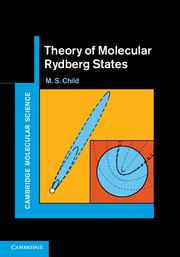Book contents
- Frontmatter
- Contents
- Preface
- 1 Molecular Rydberg states
- 2 The quantum defect picture
- 3 Ab-initio quantum defects
- 4 Frame transformations and channel interactions
- 5 Competitive fragmentation
- 6 Photo-excitation
- 7 Photo-ionization
- 8 Manipulating Rydberg states
- Appendix A MQDT normalization
- Appendix B Alternative MQDT representations
- Appendix C Rotational frame transformations
- Appendix D Optical transition and photo-ionization amplitudes
- Appendix E Generalized MQDT representation
- Appendix F Notation
- Index
Appendix C - Rotational frame transformations
Published online by Cambridge University Press: 07 October 2011
- Frontmatter
- Contents
- Preface
- 1 Molecular Rydberg states
- 2 The quantum defect picture
- 3 Ab-initio quantum defects
- 4 Frame transformations and channel interactions
- 5 Competitive fragmentation
- 6 Photo-excitation
- 7 Photo-ionization
- 8 Manipulating Rydberg states
- Appendix A MQDT normalization
- Appendix B Alternative MQDT representations
- Appendix C Rotational frame transformations
- Appendix D Optical transition and photo-ionization amplitudes
- Appendix E Generalized MQDT representation
- Appendix F Notation
- Index
Summary
The analytical forms for a variety of rotational frame transformations are given here. In view of the diversity of angular momentum coupling schemes, attention is first restricted to diatomic molecules, within the framework of Hund's coupling cases [5], which differ according to the relative importance of three factors – the electronic energy splitting between different ∧ components, the strength of spin–orbit coupling, and the rotational energy-level separations. The relative values of these three quantities allow six possibilities, each of which has a characteristic form for its parity-adapted wavefunction, although Hund himself only covered cases (a)–(d). This discussion is restricted to situations in which the Rydberg electron in a neutral molecule, which conforms to case (a), (b) or (c), is uncoupled from the molecular axis, to leave the positive ion in the same case as the parent molecule. Such excitations correspond to transformations of the type (a)→(e), (b)→(d) and (c) → (e′). The first of these has been most fully described by Jungen and Raseev [6]. The second is discussed in its simplest form in Chapter 4.2, along lines pioneered by Fano [7]. A fuller account, applicable to species with open shell cores, is given below. The final (c)→(e′) case, which has as yet found no application in the literature, is mentioned for completeness, but not treated in detail.
The final section includes results for the rotational frame transformation for asymmetric tops, in the absence of spin, which goes beyond earlier work [8], by employing permutation inversion symmetry [9].
- Type
- Chapter
- Information
- Theory of Molecular Rydberg States , pp. 282 - 294Publisher: Cambridge University PressPrint publication year: 2011

